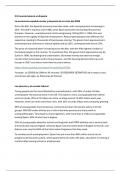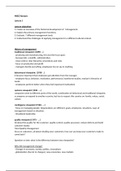2 El mundo laboral en España
La economía española antes y después de la crisis del 2008
Since the 60s, the Spanish economy has been stale, with unemployment increasing to
20%. This didn’t improve until 1986, when Spain joined the Comunidad Economica
Europea. However, unemployment continued growing, hitting 25% in 1994; this was
blamed on the rigidity of Spanish employment. Reducing employees was difficult and
expensive, leading to thousands of businesses closing. The government approved part-
time/temporary contracts to reduce rigidity and by 2001, unemployment was at 10%.
The price of living had been increasing since the 80s, with the fifth highest number of
homeless people in the country. To counteract this, the government approved la Ley de
Suelo in 1998, facilitating land urbanisation. Borrowed money was leant to foreign
construction businesses and to house buyers, and the housing demand shot up until
houses in 2007 cost twice more than ten years before.
https://www.youtube.com/watch?v=xe3mQmG57Bw
Youtube- La CRISIS de 2008 en 30 minutos | El RESUMEN DEFINITIVO de la mayor crisis
económica del siglo, by Memorias de Tiburón
Los jóvenes y el mundo laboral
Young people are the most affected by unemployment, with 30% of under-thirties
unemployed- the second worst in the UE. This leads to ninis, young people that neither
work nor study; 20% of 18-24yos are ninis, costing around 15,000 million each year.
However, there are more sisis than ninis, with 32% of under 29yos and constantly growing.
66% of young people have temporary contracts and earn the lowest salary of all the
groups. 600 000 under-thirties are in risk of extreme poverty and many work in
overqualified jobs. This leads to mass migration, with more than a million young people
leaving Spain- 90% of who have a degree.
30% of young people abandon school and linguistic and STEM abilities are in serious lack.
A third of jobs require English, whereas Spain has the lowest level of English in the UE, and
Adecco can only find 40% of the Information Engineers that they need.
To combat youth unemployment, Spain has put more than 800 million euros into el
programa de Garantia Juvenil, which guarantees all under-25s jobs, education or training 4
months after leaving school or employment.
La economía española antes y después de la crisis del 2008
Since the 60s, the Spanish economy has been stale, with unemployment increasing to
20%. This didn’t improve until 1986, when Spain joined the Comunidad Economica
Europea. However, unemployment continued growing, hitting 25% in 1994; this was
blamed on the rigidity of Spanish employment. Reducing employees was difficult and
expensive, leading to thousands of businesses closing. The government approved part-
time/temporary contracts to reduce rigidity and by 2001, unemployment was at 10%.
The price of living had been increasing since the 80s, with the fifth highest number of
homeless people in the country. To counteract this, the government approved la Ley de
Suelo in 1998, facilitating land urbanisation. Borrowed money was leant to foreign
construction businesses and to house buyers, and the housing demand shot up until
houses in 2007 cost twice more than ten years before.
https://www.youtube.com/watch?v=xe3mQmG57Bw
Youtube- La CRISIS de 2008 en 30 minutos | El RESUMEN DEFINITIVO de la mayor crisis
económica del siglo, by Memorias de Tiburón
Los jóvenes y el mundo laboral
Young people are the most affected by unemployment, with 30% of under-thirties
unemployed- the second worst in the UE. This leads to ninis, young people that neither
work nor study; 20% of 18-24yos are ninis, costing around 15,000 million each year.
However, there are more sisis than ninis, with 32% of under 29yos and constantly growing.
66% of young people have temporary contracts and earn the lowest salary of all the
groups. 600 000 under-thirties are in risk of extreme poverty and many work in
overqualified jobs. This leads to mass migration, with more than a million young people
leaving Spain- 90% of who have a degree.
30% of young people abandon school and linguistic and STEM abilities are in serious lack.
A third of jobs require English, whereas Spain has the lowest level of English in the UE, and
Adecco can only find 40% of the Information Engineers that they need.
To combat youth unemployment, Spain has put more than 800 million euros into el
programa de Garantia Juvenil, which guarantees all under-25s jobs, education or training 4
months after leaving school or employment.







